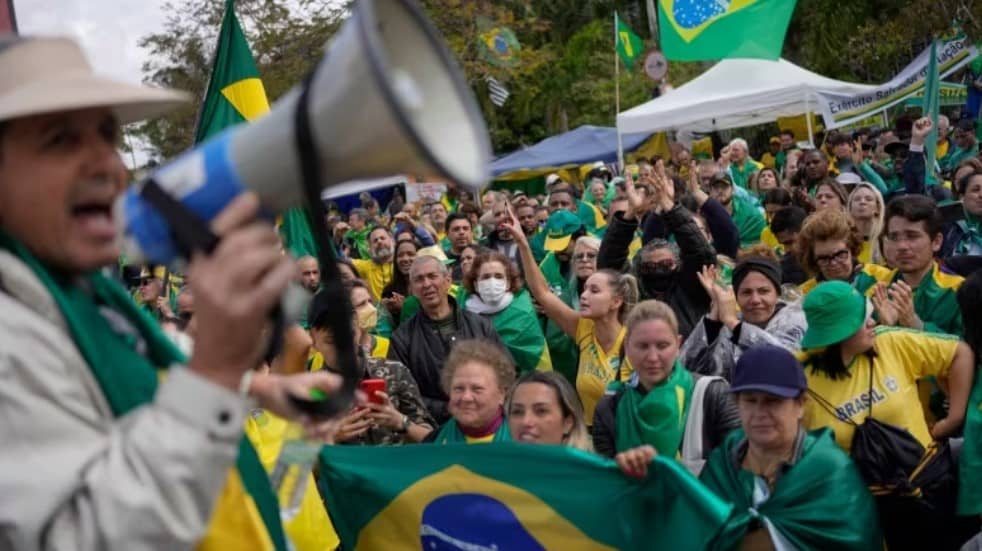ASUNCIÓN, Paraguay — The last leg of Pope Francis’ whirlwind tour through Latin America began Friday, where in Paraguay’s capital city he praised the friendliness and welcoming nature of its people, a nation that remains intact, he said, despite enduring terrible sufferings brought on by war, fratricidal conflict, lack of freedom, and a general contempt for human rights.
“The Paraguayan people have also shown an admirable spirit of perseverance in surmounting adversities and in working to build a prosperous and peaceful nation,” Francis said at the Presidential Palace in Asunción.
As he’s done previously, Francis acknowledged and expressed profound admiration for the role played Paraguayan women during those tumultuous years.
“As mothers, wives, and widows, they shouldered the heaviest burdens; they found a way to move their families and their country forward, instilling in new generations the hope of a better tomorrow” the pontiff said, referring to the aftermath of the 1866-1870 “War of the Triple Alliance,” which pitted locals against Brazil, Uruguay, and the pope’s native Argentina. Paraguay was devastated, losing approximately 90 percent of its pre-war population and leaving a disproportionate ratio of eight women for every man.
Francis called on the country to remember its history, because a people without roots has no future, he said. However, he added, memory must be based in justice and it must reject hatred and all desire for revenge in order to be an inspiration for building a future of serene coexistence.
“It also makes us realize the tragedy and pointlessness of war. Let there be an end to wars between brothers,” Francis said.
Francis is the second pope to visit Paraguay; Saint John Paul II visited 27 years ago. And just like that visit, the ceremony at the Silvio Pettirossi International Airport to welcome Francis was cut short by the rain.
There was enough time, however, for a chorus of 200 children to sing Paraguay’s national anthem in Guarani, one of the most-widely spoken indigenous languages of the Americas, as well as the Vatican’s hymn. There was also a colorful folkloric dance that included a man sporting an indigenous costume and a woman representing Our Lady of Caacupé, the patron saint of Paraguay.
Horacio Cartes, Paraguay’s president, greeted Francis at the airport. Later, Cartes offered Francis a soccer jersey of Paraguay’s national team with “Papa Francisco” printed on the back as well as a wool manta made in the region inhabited by Jesuit missionaries during the colonial era.
“Gifts without problems,” quipped the Rev. Federico Lombardi, the Vatican’s spokesman, referring to the “communist crucifix” Bolivia’s president Evo Morales gave to Francis earlier in the week.
Francis praised Paraguay’s latest efforts to build a stable democracy, improving its educational system and health care, and, in vintage Francis style, he also said that the poor and needy have to be given priority of place.
“May all social groups work to ensure that there will never again be children without access to schooling, families without homes, workers without dignified employment, small farmers without land to cultivate, or peasants forced to leave their lands for an uncertain future” he said.
Care for the underprivileged is bound to be a constant in the pope’s eight planned addresses, since Paraguay is among the poorest nations in the region, with half of the country’s 7 million inhabitants living in poverty, including 30 percent scraping by with less than $300 per month.
Francis will remain in Paraguay until Sunday. He arrived to his native Latin America Monday, when he landed in Ecuador, delivering several messages centered on the family and protecting the environment. He also spent two days in Bolivia, where he visited one of the continent’s most infamous prisons and participated in a Vatican-sponsored international meeting of laborers and workers.
While in Paraguay, the pope is scheduled to visit the Shrine of Our Lady of Caacupé, where he’ll celebrate the first of the two open-air Masses scheduled for this weekend. He will also have a private meeting with local bishops, during which he’s expected to deliver a strong message calling for unity and demand a more coherent witness within the Church, since spats between the local hierarchy have been covered widely in the local press.

















